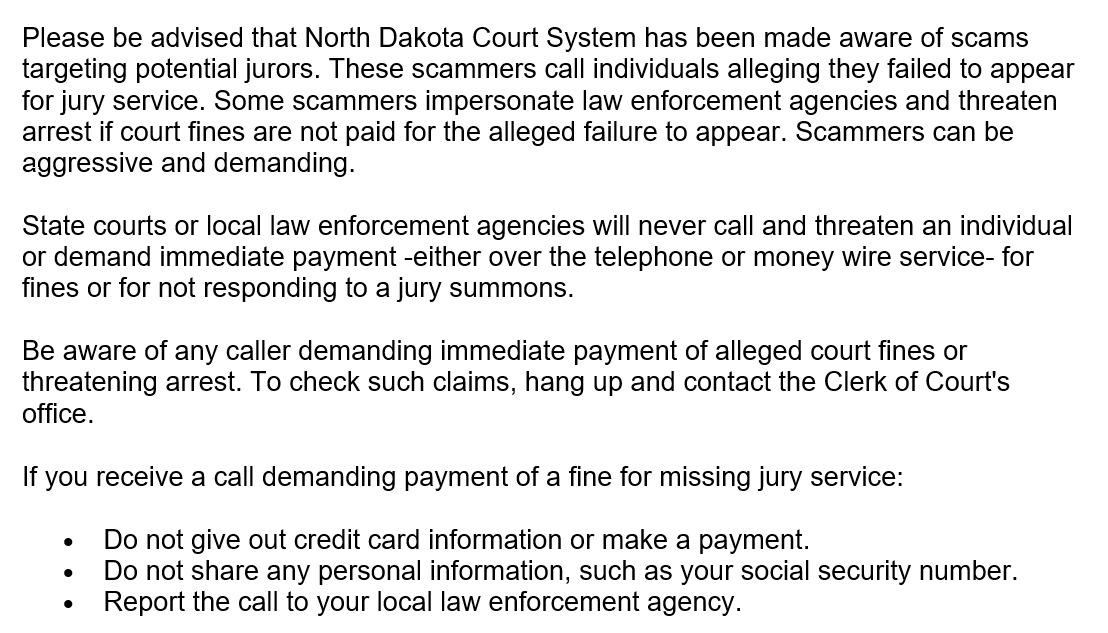Jury Service
Welcome! You've been selected for jury service in a North Dakota court. You have a key role in the state's justice system. The right to a trial by jury is one of the foundation stones of this country's courts. You probably have a lot of questions. Who wouldn't? We’ve answered some of the most frequently asked questions below.
Here are the next steps if you have been summoned for jury service:
| Step #1: | Complete the qualification questionnaire within ten days of receiving this summons. |
| Step #2: | If you are requesting excusal or deferral fill out the request. Proceed to step #3 if you are not requesting excusal or deferral. |
| Step #3: | Follow the reporting instructions on your letter. If you must report, please be advised that your court date/time may change with the court’s calendar. If you have other questions, feel free to contact your local District Court Clerk |
Juror Orientation Video
See also: Jurors, the Internet, and Social Media
Click here to view jury duty brochure.
Jury Scam Notice

Questions & Answers
To serve as a juror in North Dakota, you must:
• Be at least 18 years old
• Be a U.S. citizen
• Be a resident of North Dakota and the county where summoned
• Be able to read, speak, and understand English reasonably well
• Be physically and mentally able to serve, with reasonable accommodation if needed (pursuant to the Americans with Disabilities Act)
• Have not lost your civil rights due to current imprisonment
(See NDCC §27-09.1-07, 12.1-33-01.)
Jurors are legally required to report for service at the time and place indicated in their summons. Failure to appear may result in contempt of court charges, fines, or jail time. If you have a conflict or emergency, contact the Clerk of Court immediately.
(See NDCC §27-09.1-15)
Yes. Jurors receive:
• $50 for the first half day
• $100 for each full day of service thereafter
• Mileage reimbursement at the current IRS standard mileage rate
Checks are usually issued within a few weeks after your service.
(See NDCC §27-09.1-17)
No. North Dakota law prohibits your employer from firing, demoting, threatening, or otherwise penalizing you for serving on a jury. However, you are encouraged to notify your employer as soon as possible about your summons and jury schedule.
(See NDCC §27-09.1-17.1)
There is no formal dress code, but courts suggest dressing in business casual attire—similar to what you might wear to work, church, or a professional appointment. Avoid wearing clothing with offensive language or graphics.
At the beginning of a trial, all potential jurors gather in the courtroom. Names are randomly selected and jurors are seated as determined by court practice. Those selected undergo a process called “voir dire”, where lawyers and/or the judge ask questions to determine if you can be a fair and impartial juror.
There are two types of challenges during this process:
• For Cause: When there is a specific reason to disqualify a juror
• Peremptory: A limited number of objections that require no explanation
Being excused is not a reflection of your character or qualifications.
• Listen attentively: Pay close attention to the evidence and arguments.
• Remain impartial: Do not discuss the case or conduct outside research.
• Deliberate thoughtfully: Collaborate with fellow jurors to reach a verdict.
If you have difficulty hearing or understanding proceedings, notify court personnel immediately.
It is rare for jurors to stay overnight in North Dakota. If a trial lasts multiple days, you will typically return home each evening and be expected to return on time. If sequestration becomes necessary, the court will inform you and make arrangements.
No prior legal knowledge is required. At the end of every trial, the judge will provide detailed instructions on the applicable law and how to apply it to the facts of the case. These are called jury instructions.
Courthouses generally provide basic facilities such as restrooms, seating areas, and water. For specific accommodations or questions, contact your local Clerk of Court.
No. North Dakota law prohibits the possession of firearms or dangerous weapons in courthouses.
(See NDCC §62.1-02-05)
Yes. Juror privacy is taken seriously. Your personal information (such as your address and phone number) is kept confidential and is not shared with the public. During trial proceedings, deliberations among jurors are private. If you have any concerns about your privacy or safety, please contact the Clerk of Court.
For more information, contact your county Clerk of Court or visit: www.ndcourts.gov

